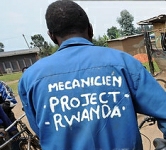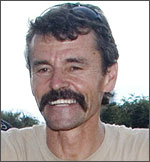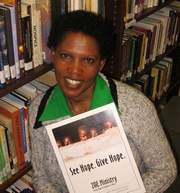New Rwandan Coffee Blend Released On US Market
Kigali: After blends sold by American coffee chain Starbucks, a separate joint initiative announced Monday that it was launching the Spring Revival(TM) Blend ďż˝ made from coffee bought from two cooperatives in Northern Rwanda.
The Spring Revival(TM) Blend will be available in 10-ounce bags, 2.2 ounce fractional packages, and K-Cup(R) portion packs for Keurig (R) Single-Cup Brewers from June 4, 2010. Buyers will also be able to get the new blend online.
The blend is the result of a partnership between Green Mountain Coffee, the Cordes Foundation, and TransFair USA – the leading third-party agency to certify Fair Trade products in the United States.
The partnership described the new coffee as �a seasonal blend that offers sweet aromas, balanced flavors and a compelling story of hope.�
The joint Clinton Global Initiative commitment of the Cordes Foundation, TransFair USA, and Green Mountain Coffee–valued at $250,000–is helping the Rwanda farming cooperatives KOAKAKA and ABAKUNDAKAWA build thriving international coffee enterprises and market their products directly to the largest consumer market in the world–the United States.
Global coffee giant Starbucks has developed its own blends from Rwanda across its stores including the Rwanda Blue Bourbon Coffee and Starbucks Rwanda Blend.
ARI-RNA
March 22, 2010 1 Comment
Bikes for Rwanda: Project Rwanda Initiative

Project Rwanda, founded by Tom Ritchey, believes that bicycle can be an important tool in rebuilding a country and building national pride.
Project Rwanda was founded by Tom Ritchey after he visited Rwanda in 2005, out of his passion for cycling, a love of Rwanda�s natural beauty, and the inspiring stories of hope of the Rwandan people. Tom�s trip resulted in a realization that the bicycle can be an important tool in rebuilding a country, building national pride and addressing local issues facing Rwanda and other African nations.
Project Rwanda currently operates with a small group of like minded Board members who all donate their time and energy to the project. Donations are primarily used to support actual projects, with only a small portion going toward the occasional need for temporary help with clerical and graphic design functions. We estimate currently that 90% of donations are used in support of actual projects. Project Rwanda has no permanent salaried staff, offices or vehicles and utilizes other agenciesďż˝ staff on the ground in Rwanda to assist with the local support of our projects.
Project Rwanda Mission Statement
Project Rwanda is committed to furthering the economic development of Rwanda through initiatives based on the bicycle as a tool and symbol of hope. Our goal is use the bike to help boost the Rwandan economy as well as re-brand Rwanda as a beautiful and safe place to do business and visit freely.
Project Categories
1. Build Awareness for Rwanda:
Increase awareness for Rwanda, the country and its people, as a tourism and cycling destination, through the development of an eco�tourism industry: annually (September �06 was 1st event) conduct a multi�day event attended by Rwanda�s, US and European riders to promote this concept.
2. Special Bike Designs:

Tom Ritchey, Founder of Project Rwanda.
Project Rwanda is actively engaged in the design, development and consults with implementation of special use bicycles to address specific needs within the country. Project Rwanda locates a foreign vendor to manufacture these bikes cost effectively for export to Rwanda (Landed cost approximately $100 ďż˝ $200). In this role PR serves as a facilitator, consultant, designer and advisor regarding the entire scope of the project. A collaborating agency actual funds the purchase, delivery and distribution of the bikes. The first undertaking is for 2,000 special hauling long bikes for use by coffee farmers to haul their crop to the washing station collection point more quickly which increases the price they receive for the coffee cherries as this is a very time sensitive step. This project is in conjunction with the Texas A & M University and their Rwanda management team, USAID/SPREAD, which funded the actual cost of the bikes.
3. Bike Distribution:
Project Rwanda plans to establish bike distribution to needed organizations that do not have existing grants to purchase bikes. This program is under development and will involve a �hand up�, not a �hand out� through a micro financing mechanism which subsidizes the cost of purchasing the bike and provides micro financing locally but requires repayment of a percentage of the bike cost over a period of time at low interest rates. It is envisioned that this micro financing mechanism, once established, will be rolled out to other African nations and non African developing nations. The need for special use bikes worldwide is estimated to be in the hundreds of millions; the bike is an affordable, practical, environmentally friendly solution to local transportation and hauling needs.
4. National Pride:
Select, coach, train, equip and promote a Rwandan National Cycling Team with the goal of successful participation in International Cycling competition as a means of promoting this industry within Rwanda and providing increasing awareness and national pride for Rwanda internationally.
Project Rwanda – http://projectrwanda.org/
March 22, 2010 No Comments
Rwanda: Genocide Survivors’ Program Gives Children A Future

Epiphanie Mujawimana is a survivor of the Rwandan genocide and founder of Zoe Ministry's Giving Hope Empowerment Project that works with children who have been orphaned by genocide and AIDS. (Lillia Callum-Penso)
Epiphanie Mujawimana has 10,000 children: four by birth, four by family members who passed away, and the rest by conscience. HIV/AIDS and genocide have left a nation of orphans in her native Rwanda and, quite simply, says the petite 45-year-old, �I could not sleep until I called them to come.�
Since 2008, when she started the Giving Hope Empowerment program through the Christian- based aid group ZOE Ministry, Mujawimana has filled the role of parent to Rwanda’s 10,000-plus orphans, helping children through carefully developed life-skills programs, food-sufficiency training and most importantly, empowerment. That is key, says Mujawimana the night before a speaking engagement at Furman University, her eyes sparkling.
The program is organized around the African model of the oldest child becoming the head of the household. Nurturing that cultural norm has meant greater success, says Jerry Hill, who has worked with Zoe Ministry through his position as minister of missions and outreach at Buncombe Street Methodist Church in Greenville. The program is self-sustaining now, as the heads of the households then take responsibility and train and care for others.
Give an orphan who has nothing the power to support himself and you give him dignity, says Mujawimana, which then becomes your most powerful tool.
�They have self-esteem, and they emerge in their communities as leaders,� Mujawimana says. �And they have that compassion and love. They want to help because they feel proud. They are no longer vulnerable.�
Mujawimana knows what it is to be vulnerable. She survived the genocide between the Hutu and Tutsi ethnic groups that swept Rwanda for almost four months in the spring of 1994, but if she thinks too hard about that time she can’t sleep at night. Her mission, though, gives her hope ďż˝ it is her answer to the nightmare.
�It is by experiencing myself these situations so I remember once I was in that situation, and I did this and this for me to get out of the situation. That is why I believe it was not a curse from God.�
ďż˝I was not disadvantaged but I was blessed to go through all of this so that I could help. And I’m ready to face more and more. It is a gift.ďż˝
It might at first seem odd, but in ways Mujawimana only now fully understands, her experience led her to where she is now ďż˝ a part of ZOE Ministry and founder of the Giving Hope Empowerment Project that has changed the lives of hundreds of children since 2008. The project has taken on new meaning in the context of other world tragedies in Haiti and Chile, where thousands of people have been left homeless and thousands of children have been left alone.
�In situations of disaster, we have many vulnerable groups, children, orphans. And relief projects are good, but we have to think bigger and what will happen after,� Mujawimana says. �I would rather work hungry instead of eating and doing nothing after. Empowerment takes longer than relief, but it helps generations and generations.�
There is hope in Mujawimana’s life now, but the path has been long.
Mujawimana doesn’t talk readily about the 1994 genocide that took the lives of 800,000 Rwandans in four months. She tiptoes around the subject at first, as though fearful that just speaking of it will reverse time and take her back to the moment she lost hope, expecting that she or family members would be killed.
�What I wanted was just to die together,� she whispers.
The day before the genocide there were rumblings. Tutsis feared for their safety. Hutu neighbors who once celebrated holidays with Tutsi neighbors suddenly became cold. Mujawimana remembers two friends from the university saying, �Oh, my God, if you protect me, someone who saves me, I will serve him or her forever.�
Neither friend survived. By the grace of God, Mujawimana, her husband Joseph and their children did.
ďż˝I can’t forget them,ďż˝ Mujawimana says softly. ďż˝They did nothing to be killed. Sometimes, we don’t understand how we survived.ďż˝
In the 16 years since, Rwanda has changed. The country, now led by President Paul Kagame, is leading reconciliation efforts to prevent further devastation. But Mujawimana remembers understanding the need to reconcile much earlier. She credits her family, her faith but most importantly, her experience.
�This is the beauty of it, is that through her past she is able to analyze,� says Hill.
Mujawimana found ZOE Ministry in 2006 when the organization she had been working with fizzled out. The issue, she realized, was in the approach. You can provide food, clothing, medicine to children, but to sustain them, they also need skills and lessons they would learn from parents.
ďż˝She’s developed a system of identifying orphans, working with the oldest, which is the African way, sharing the gospel with them, sharing that they’re no longer alone and that they have now a family if they choose to participate,ďż˝ Hill says. ďż˝The orphans spontaneously begin to adopt other orphans because they become food-sufficient. Before they even become income-generating, they begin reaching out. As the groups form they also identify people in trouble. There may be a mom with AIDS and they go and help.ďż˝
That is the true measure of success for Mujawimana, because it’s what will sustain Rwanda in the future. She sees her country now not as Hutus and Tutsis, but through its children.
ďż˝You know the future nation of a country is with the youth of today. If we did not help those young people to grow in a holistic way, we won’t have a nation; we have a dead nation.ďż˝
Seeing the children thrive is what gives her hope today.
by Lillia Callum-Pensoďż˝ – greenvilleonline.com
March 22, 2010 No Comments
